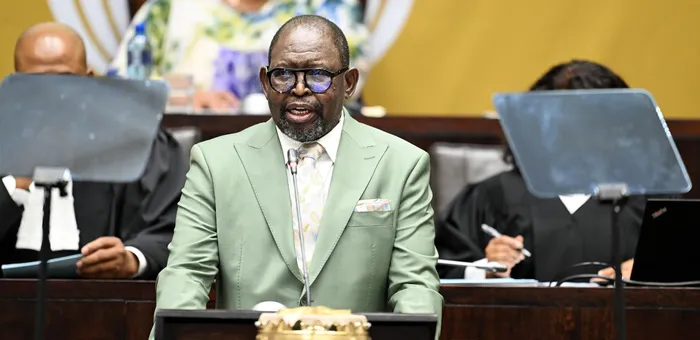
Finance Minister Enoch Godongwana tabled his Medium Term Budget Policy Statement this week.
Image: Phando Jikelo / RSA Parliament
Finance Minister Enoch Godongwana on Friday hit back at critics of the 2025 Medium-Term Budget Policy Statement (MTBPS) and the proposed 3% inflation target.
Godongwana said there was a mistaken assumption that an inflation target will necessarily generate high interest and higher costs.
“Our projection is that the interest rate, as a result of lower inflation, is also going to come down, which will cushion the impact on the poor and their cost of living,” he said.
Godongwana was responding to questions when the National Treasury was briefing the parliamentary committees on finance and appropriation on the revised and proposed fiscal framework.
Tabling the MTBPS on Wednesday, the minister lowered the inflation target to 3% with a one percentage point tolerance band.
However, EFF MP Omphile Maotwe accused Godongwana of lowering the inflation target after he had gone to meet with international markets and investors, JP Morgan and Golden Sachs, without making consultations in the country.
“The social partners and democratic structures have not been consulted,” Maotwe said.
She asked whether the National Treasury had consulted with Nedlac, Cosatu, Saftu, the SACP, ANC, Black Business Council, and the South African Banking Association before arriving at the inflation target.
Maotwe took a swipe at the National Treasury for holding a meeting with Nedlac only on Friday, two days after the MTBPS was tabled.
“We can’t say we are consulting, but it is a consultation outside of the country,” she said, adding that the consultation with Nedlac was after the fact.
“We have reached a conclusion that you hate black people. You attempted a VAT increase, introduced a fuel levy, and now an inflation target. It is the banks that will benefit. We have no confidence in you and came to the conclusion that you don’t like black people,” added Maotwe.
MK Party MP Wesley Douglas said the MTBPS was a political signal of where the Government of National Unity intended to take the country over the next four years.
“It is more of the same, maintaining the status quo of the last 30 years, a decline of the past seven years. This current administration has led us into exponential economic decline, increased poverty, and the highest unemployment rate in the world,” he said.
“What we see in the MTBPS is not a plan for growth, not a plan for jobs, not a plan for development, but a plan for managed decline and increased dependency on Western finance institutions like the World Bank and IMF that makes us subject to their conditionalities, which work against the solid interest of the South African people,” Douglas said.
In a veiled response to Maotwe, Godongwana said if she read the MTBPS, it was clear that consultation was not about everybody on earth.
“Consultation is within government, with the president and the Cabinet. Then I come to this House, and this House then must interrogate my presentation. That is what we are doing today,” he said.
Godongwana also said they had made a point that in case of shocks, they have allowed for a one percent tolerance band.
“It cannot be true that inflation, the assumption is that there will necessarily be an increase in the interest rate, and therefore you attack the poor, and Godongwana hates black people.
“The problem is, I sympathise with you because when Nelson Mandela was released, you were eight years, eight months. You do not have an understanding of the struggle of the black people,” he said.
Pointing his attack at the MK Party, Godongwana said it assumed that their leader, former president Jacob Zuma, never ran this country.
“When their president ran this country, he took R53 billion from the defence force, R42 billion from the police, and R243 billion from education and health to fund State Capture at state-owned enterprises. Now they come and lecture us about this sort of thing.”
He said there should be a rational debate on the inflation target.
“It (inflation target) must be attacked on the soundness of the economics.”
mayibongwe.maqhina@inl.co.za